Writing for Community Change
Elisa Stone
- College Is More Than a Traditional Classroom Education
- Doing Service to Enhance Your Learning Improves Your Own Well-Being
- How Does It Work?
- What Does Research Tell Us About the Efficacy of Service-Learning?
- What About the Sciences? Isn’t Service-Learning Just for Humanities?
- Writing for Community Change Is for You!
- Personal Experience Narrative & Photos
COLLEGE IS MORE THAN A TRADITIONAL CLASSROOM EDUCATION
As a college student, it’s easy to get hung up on the consumer aspects of your education: having to pay tuition and fees, spend obscene amounts for textbooks you may not end up using again, balance work and studies, and avoid being broke, hungry, and exhausted. You may even have a family to take care of, whether it’s fur kids or human kids or loved ones, on top of getting yourself an education. No one could argue that it takes an act of courage and dedication on your part to do what you’re doing right now.
Once you jump through all the hoops, finish all your classes, and proudly display your degree, you’ll go on to your next degree or delve into your career, which will present a new set of obligations and challenges. Either way, life tends to be busy and stay busy.
Still, college is about more than an education, more than just taking class by class, semester by semester, to get where you want to go. College was designed to teach us to be whatever we want to be when we grow up (assuming we do grow up at some point), but it is also intended for a larger purpose: to make us good citizens. We live in a country where we elect our leaders and make choices about many aspects of our lives; we are allowed to voice our opinions, requests, and even demands to our elected officials. With this privilege comes an obligation, and that obligation is to be contributing members of society who work towards the greater good of all.
DOING SERVICE TO ENHANCE YOUR LEARNING IMPROVES YOUR OWN WELL-BEING
Why should you care? Well, maybe you don’t care, right at this moment, since we already covered how busy you are and how stressed you must be and how little sleep you are probably getting. Still, research shows that what makes people truly happy tends to involve working toward a cause outside of their own immediate needs and wants: in other words, service to others actually improves your own well-being (Hopper, 2020).
What does this mean in a college setting? Ernest Boyer, President of the Carnegie Foundation for the Advancement of Teaching and former U.S. Commissioner of Education, tells us that “the academy must become a more vigorous partner in the search for answers to our most pressing social, civic, economic, and moral problems, and must reaffirm its historic commitment to what I call the scholarship of engagement.” He says that colleges and universities must be staging grounds for action if we are to provide in-depth learning for students and meaningful change in improving the world around us.
What does this have to do with writing? Or you? Salt Lake Community College has a history of combining service and learning in ways that allow students to gain hands-on experience, write for audiences outside of their classrooms, and change the way they see their role in the communities around them. Many of your professors will support the idea that you can use college writing assignments to create texts that will help communities change for the better.
HOW DOES IT WORK?
Let’s get specific about how. Technical Writing is one of the core composition classes students take as an alternative to Intermediate Writing, ENGL 2010. One semester, SLCC’s Thayne Center for Service & Learning was approached by a local family called the Ahuna family. They had created a performance group to travel around to various community events and share their family’s traditional Hawaiian song and dance with others, and at the same time honor and preserve their cultural heritage. “Ohana” is a Hawaiian word for “family,” and so they called themselves “Ahuna Ohana,” for the Ahuna family. They needed help with publicity. They wanted a logo, a web site, and a promotional video. As a non-profit group, they did not have the funds to hire professional marketers. A team of SLCC Tech Writing students agreed to take on the project. Meeting in a conference room down the hall from their regular classroom, the students worked with the Ahunas (including Grandpa Joe, who started their dance group and had very strong opinions about finding just the right fiery flame image for their logo) until the heart and soul of the Ahuna Ohana dance troupe could be proudly displayed online. The writing that students were able to create with this project included formal and informal correspondence with the Ahuna family in the form of memos/emails, descriptions/narrations of the Ahuna Ohana dance troupe, their mission, and their history, and the equally important work of visual design work and web content with a real-world client, all of which are emphasized in technical communication. This is one of the countless ways students can combine service and learning to gain valuable skills that make you more employable, help you have an impact, and come away with a sense of satisfaction knowing you truly helped someone who needed you.
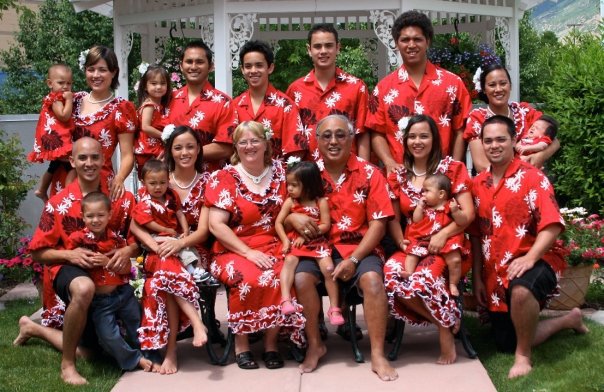
There are many more examples. Did you know SLCC English students have done service, writing, and/or presentations for countless non-profit organizations and schools in our community? They have been involved with the United Way, the Utah Food Bank, Utah Food Rising, Catholic Community Services, Tree Utah, and so many more! For those who really get excited about service and learning, our college even has an Engaged Scholar program for students who want to do 100 hours of service over the course of their entire degree and graduate with special honors! We also offer alternative fall break service opportunities locally as well as alternative spring break trips to places like Seattle, San Francisco, and Best Friends Animal Society in Kanab for students who want to serve during spring break and reflect on the issues that we can do something about, such as food insecurity, homelessness, environmental preservation, LGBTQ+ issues, and helping animals in need. Not only does service contribute to a greater sense of personal well-being and happiness; writing and reflection help us make these experiences into artifacts that show we are, indeed, good citizens.

But let’s face it: being a good citizen doesn’t always help us make rent or have enough money to see a movie. Did you know, though, that writing for community change actually enhances student learning, and that it leads to greater employment opportunities? Being a good citizen, in other words, can actually help you get a higher GPA and be a more attractive candidate to not only prospective employers, but also to transfer institutions if you plan to pursue additional education after your current degree.
WHAT DOES RESEARCH TELL US ABOUT THE EFFICACY OF SERVICE-LEARNING?
Where’s the proof of this? Let’s take a look at some research. What does national research tell us about the employability of students trained in community-based experiential learning and problem solving? The American Association of Community Colleges (AACC) commissioned Hart Research Associates to survey 400 employers from organizations with a minimum of 25 employees, at least 25% of whom have degrees from either two-year or four-year schools, with the goal of identifying learning outcomes favored in today’s economy, including the importance of applied learning experiences and project-based learning (2015, p. 1). Their findings were as follows:
- Did you know that 96% of employers say that no matter what field of study you are in, students should have college experiences that teach you how to problem-solve with people whose views are different from your own?
- Not only that, but a majority of employers think students from all fields of study “should gain an understanding of democratic institutions and values (87%), take courses that build the civic knowledge, skills, and judgment essential for contributing to a democratic society (86%), acquire broad knowledge in the liberal arts and sciences (78%), and gain intercultural skills and an understanding of societies outside the United States (78%)” (2015, p. 2).
Furthermore, a significant majority of employers surveyed by Hart Research Associates indicated they would be more likely to hire a recent graduate who has completed various types of “applied and engaged learning experiences—such as a comprehensive senior project, a collaborative research project, a field-based project with people from other backgrounds, or a community-based or service learning project” (AACC p. 7).
Given that employers value the learning outcomes and experiential learning a service-learning experience can provide, what do students say about the importance of these concepts? In the same study mentioned above, in 2013 Hart Research Associates surveyed over 600 college students, including 158 community college students who planned to earn their associate degree or transfer to a university. (2015, p. 1). Their findings were as follows:
| Students Agree with Employers on the Value of Applied Learning Experiences
Proportion of employers and students who say a company would be more likely to consider hiring a recent college graduate if they have had this experience |
||
| Employers % | College Students % | |
| Internship/apprenticeship with company/organization | 94 | 95 |
| Senior thesis/project demonstrating knowledge, research, problem-solving, and communication skills | 87 | 89 |
| Multiple courses involving significant writing | 81 | 76 |
| Research project done collaboratively with peers | 80 | 82 |
| Service-learning project with community organizations | 69 | 85 |
| Field project in diverse community with people from different backgrounds/cultures | 66 | 87 |
| Study abroad program | 51 | 71 |
Importantly, both employers and students saw the need for improvement in providing students a wide range of knowledge and skills that apply to their fields (p. 9).
WHAT ABOUT THE SCIENCES? ISN’T SERVICE-LEARNING JUST FOR HUMANITIES?
It’s all good, you say, but that’s for you Humanities types. I’m in the sciences! I plan to study chemistry, or math, or engineering, so writing for community change doesn’t really apply to my field or my future. Hold up . . . it does! Issues of social justice have become an integral part of curriculum in many disciplines. For example, social justice is important to strong, ethical science in the real world. The kind of communication and writing you’ll do in service-learning is a required skill for science and engineering. This approach to learning comes not only from concern for the well-being of society; it also comes in order to deliver skills and knowledge base to students for hire-ability and for successful post-graduate education. Students of disciplines that are traditionally associated with issues of peace and justice such as political science, communication, and social work will most certainly benefit from service-based writing. Yet a student of any discipline can stand to benefit from this opportunity.
In 2015, the Association of American Medical Colleges unveiled the new MCAT (Medical College Admission Test) which all prospective medical students must complete to apply to medical school (AAMC, 2015). The largest change in the new test was as much as a quarter of the test now includes content involving social and psychological principles. These can be seen in the test’s “Foundational Concepts” 6–10. Concerning issues of social justice, examples are seen in Foundational Concept 9, “Cultural and social differences influence well-being” and Foundational Concept 10, “Social stratification and access to resources influence well-being” (AAMC, 2015). The purpose of incorporating these concepts into the required curricula of all pre-med students is to ensure that the next generation of medical doctors have social and cultural understanding around issues of socioeconomic status, race, religion, gender, and other social justice issues.
While it is generally recommended that students take at least one introductory psychology and introductory sociology course in order to learn this, many students are likely to wish to engage in the material at a deeper level. This is not a new phenomenon in the medical disciplines, as shown by programs like Doctors Without Borders who have incorporated social justice into their mission already in their humanitarian causes (“Neglected People,” 2015). Students who intend to take an educational path in health care come to it through many undergraduate majors including biology, psychology, chemistry, nursing, etc. Service-based writing would be applicable and desirable to students intending on a career in health care from a variety of majors.
The field of psychology has always had a social justice component, although it was not always in the forefront of the field. But now, the APA (American Psychological Association) and APS (Association for Psychological Science) have charged the field to advocate for research and application of social justice issues in the field as a whole (Vasquez, 2012; Meyers, 2007). Salt Lake Community College offers an Associates in psychology and we know that many more General Studies students will go on to complete a bachelor’s degree in psychology or higher, as it is one of the largest undergraduate majors in the United States (Casselman, 2014). Psychology classes interested in community service can, for example, take on nutritional choices of students, conducting a literature review, ethnographic research, and nutritional data, then create a social media campaign to help individuals make informed, healthy choices in campus dining areas. The same type of project could be undertaken in a K–12 educational environment, perhaps with the goal of educating parents as well.
Natural and cultural resource management and outdoor recreation is a predominant area of employment in Utah and the American West (see USAJOBS.gov for a clearinghouse of all federal job opportunities). Occupations vary from rangers working within our national parks to field biologists to agriculture. Many of our students hope to—and will— find themselves in these types of fields. Within the needs of resource management includes the human factor. And these disciplines have been incorporating the cultural, economic, and social needs of people into their management plans. What they need are more people trained in social justice awareness and in the human component or resource management. For one example of social justice conflict in park management, see Al Jazeera America’s article on displacement of indigenous people in the name of conservation (Lewis, 2015, August 14). Students interested in writing for community change could join with non-profit organizations writing grants or litigate cases aimed at restorative justice for indigenous peoples. These issues are ongoing.
WRITING FOR COMMUNITY CHANGE IS FOR YOU!
Writing for community change via a service-learning experience, or even an internship, would be applicable and navigable by any student in the sciences who wishes to dive deeper into their learning of these issues within the standard curricula of their fields. These fields are specifically asking for the traits and skills in the next generation of graduates and employees that we hope to create at SLCC.
Hey, not everyone loves English classes or writing; we get that. Sometimes even professional writers hate writing too! But since we all need writing for classes, everyday life, and career success, why not make it count for community change as well? Don’t take our word for it; try service-learning for yourself and see how the satisfaction of knowing you made a difference helps all the stress from studying, work, bills, balancing your life, and catching your breath fade away long enough to make you smile. ☺
PERSONAL EXPERIENCE NARRATIVE & PHOTOS
Service-Learning Abroad: Helping the Desmond Tutu HIV Foundation in South Africa
By Elisa Stone, SLCC English Professor
I’ve never wanted to ask my students to do something I wouldn’t be willing to do myself, and so I’ve been volunteering alongside them ever since I first became interested in service-learning. In summer of 2015, I was invited by Westminster College’s Professor Rulon (Ru) Wood to help his team of professional communication students create an anti-stigma campaign for the Desmond Tutu HIV Foundation. South Africa has the largest, most high-profile HIV epidemic in the world. As of 2013, approximately 6.3 million people there were living with HIV, including 330,000 new infections and 200,000 South Africans who died from AIDS-related illnesses (avert.org). Although the Foundation has substantial supporters and resources, they still need marketing assistance.
Our service-learning team met weekly at Westminster and held early-morning Skype meetings with the Foundation. During fall break, Ru and I journeyed to South Africa to meet with Foundation leaders at the University of Cape Town to finalize the anti-stigma campaign. They loved my “Love, Don’t Judge” slogan, which was made into bracelets, t-shirts, and debuted at the 21st International AIDS Conference in summer of 2016. We then headed to Gugulethu Township to attend a community workshop for youth living with HIV/AIDS and to film video interviews with a pioneering doctor in the HIV clinic as well as counselors and kids who were born HIV positive, with the goal of helping erase stigma for those needing diagnosis and treatment for HIV/AIDS (Wood, 2016).
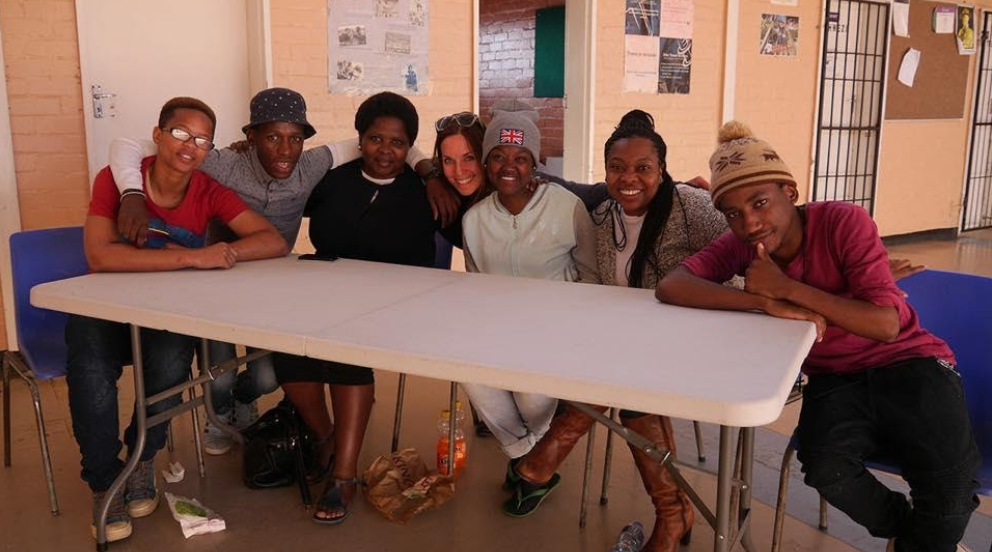
While in Cape Town, Ru and I visited Robben Island, where Nelson Mandela was imprisoned and tortured for 18 years. We met several Freedom Fighters, including Mr. Visumsi Mcongo, who had dinner with us and allowed us to record his story of being a political prisoner with Mandela for 14 years. Mr. Mcongo accepted my gift of love beads that had been given to me by a stranger in SLC to wish me luck on my journey. Ru hoped to bring Mr. Mcongo, who has never been to America and would very much like to visit, to Westminster College as a guest lecturer.
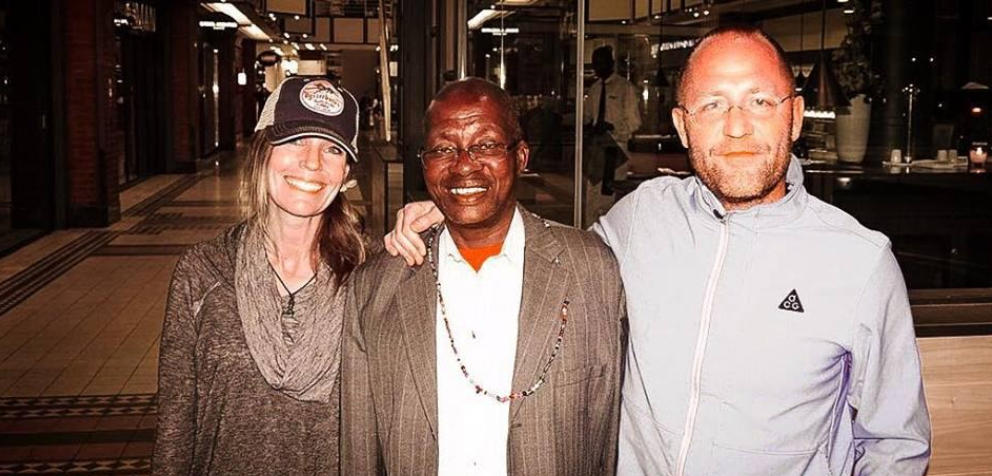
We also learned about apartheid and visited non-profit organizations on a philanthropic cultural tour with an organization called Uthando, a Xhosa word for “love.” It was gratifying to support an animal shelter, children’s daycare center, and seniors’ recreation center while honoring the personal histories of those who endured apartheid and continue to suffer its aftermath.
The Desmond Tutu HIV Foundation requested I return again in spring of 2016 with Ru and a cohort of Westminster’s professional communication students to film and produce additional videos for the DTHF Youth Centre in Masephumelele, an under-resourced community south of Cape Town. I was asked to conduct poetry and storytelling workshops for HIV positive high school students and young adults, collaborating with them to combat stigma by creating Public Service Announcements.
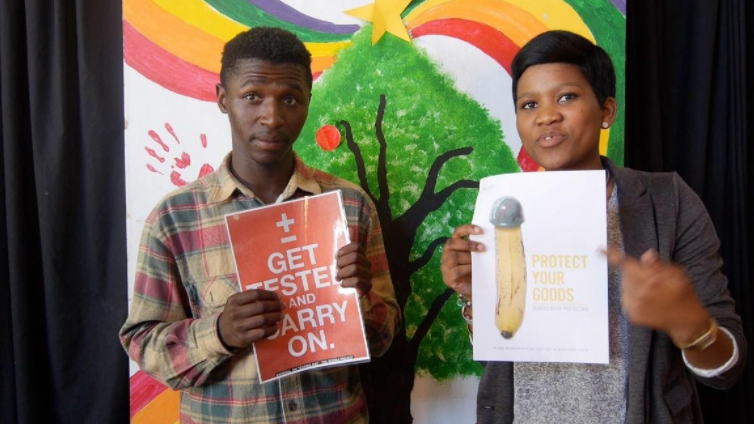
To my joy, I was invited to have coffee with Desmond Tutu himself, including attendance at a Peace with Justice Award Ceremony for he and his wife Mama Leah Tutu at St. George’s Cathedral in Cape Town. Though it was a rather epic endeavor to get myself back to Cape Town, as the rest of the group was on safari, I opted to return on my own to honor the invitation to meet Tutu, whom I consider to be one of the greatest heroes in all of human history for his bravery in combatting racism, violence, and risking not only imprisonment, but his life—many times over—during South Africa’s apartheid. Archbishop Emeritus Tutu, a Nobel Prize winner, responded to our project with great enthusiasm, graciously accepting my “Love, Don’t Judge” anti-stigma bracelets for he and his wife. Meeting him is a moment I will always cherish and reflect upon as one of the greatest of my life.
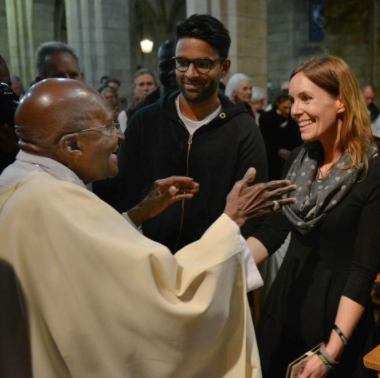
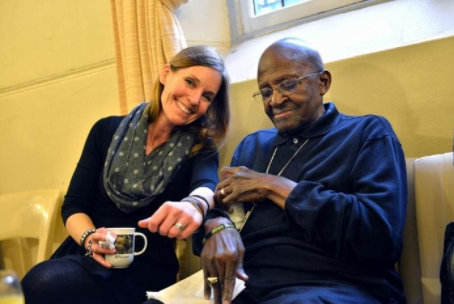
As a devoted practitioner of service-learning, I am elated and humbled by the opportunity to work towards social justice on a global scale. Lifelong friends from Africa and beyond are my greatest gift from this affirming experience. I believe individuals can, and do, make a difference in their communities and their worlds. I believe we owe it to ourselves to try, even if our impact isn’t grandiose. Service benefits those who serve just as much as the recipients; it is reciprocity that keeps this practice at the heart of meaningful education. If you are thinking of trying service-learning, do it! Start small and don’t obsess over obstacles; you never know where the path of civic engagement will take you!
References
Ahuna ‘Ohana (Photographer). (2016, July 18). Ahuna ‘Ohana [digital image]. Retrieved from www.facebook.com/pages/category/Nonprofit-Organization/Ahuna-Ohana-146953438695573/
Association of American Colleges & Universities. (2015). Falling short? College learning and career success selected findings from online surveys of employers and college students. Hart Research Associates.
Association of American Medical Colleges (2015). What’s on the MCAT2015 exam? Retrieved from www.aamc.org/students/services/343550/mcat2015.html#psbb on Sept 1st, 2015
Boyer, E. (1996). The Scholarship of Engagement. Journal of Public Service & Outreach, 1(1) 11–21.
Casselman, B. (2014, Sept 12th). The economic guide to picking a major. FiveThirtyEight Retrieved from fivethirtyeight.com/features/the-economic-guide-to-picking-a-college-major/ on Sept. 1st, 2015.
Community Learning Partnership. (2013). Listening—building—making change: job profile of a community organizer.
Doctors Without Borders (2015). Neglected people. Retrieved from www.doctorswithoutborders.org/our-work/humanitarian-issues/neglected-people on Sept 1st, 2015.
Hopper, E. (2020, July 3). How Volunteering Can Help Your Mental Health. Greater Good Magazine. greatergood.berkeley.edu/article/item/how_volunteering_can_help_your_mental_health
Lewis, R. (2015, August 14th). “Violent displacement’ in the name of conservation must end,” group says. Al Jazeera America. Retreived from america.aljazeera.com/articles/2015/8/14/american-conservation-hurts-biodiversity-natives.html on Sept 1st, 2015.
Miller, E. (Photographer). (2016). Untitled [photograph]. Cape Town, South Africa.
Miller, E. (Photographer). (2016). Untitled [photograph]. Cape Town, South Africa.
Myers, S.A. (2007). Putting social justice in practice in psychology courses. Observer, 20(9) Retrieved from www.psychologicalscience.org/index.php/publications/observer/2007/october-07/putting-social-justice-into-practice-in-psychology-courses.html on Sept 1st, 2015
Stone, E. (Photographer). (2016). Freedom Fighter, Robben Island Former Prison [photograph]. Cape Town, South Africa.
Stone, E. (Photographer). (2010). SLCC Alternative Spring Break Volunteers, Best Friends Animal Sanctuary [photograph]. Kanab, Utah.
Vasquez, M.J.T. (2012). Psychology and social justice: Why we do what we do. American Psychologist, 67(5) 337–46. Wood, R. (Photographer). (2016). Group Photo in Cape Town, Desmond Tutu HIV Foundation [photograph]. Cape Town, South Africa.
Wood, R. (Photographer). (2016). Group Photo in Cape Town, Desmond Tutu HIV Foundation [photograph]. Cape Town, South Africa.
Wood, R. (2016). Love. [Video]. Youtube. https://www.youtube.com/watch?app=desktop&v=Y1Uia7bNOZg
Wood, R. (Photographer). (2016). PR Campaign, Desmond Tutu Youth Centre [photograph]. Cape Town, South Africa.

